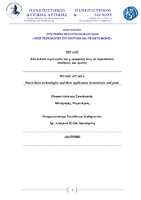| dc.contributor.advisor | Leligou, Helen C. (Nelly) | |
| dc.contributor.author | Μπαϊράμης, Μερκούριος | |
| dc.date.accessioned | 2024-04-25T09:06:21Z | |
| dc.date.available | 2024-04-25T09:06:21Z | |
| dc.date.issued | 2024-03-26 | |
| dc.identifier.uri | https://polynoe.lib.uniwa.gr/xmlui/handle/11400/6609 | |
| dc.identifier.uri | http://dx.doi.org/10.26265/polynoe-6445 | |
| dc.description.abstract | Η Ελληνική εμπορική ναυτιλία ήταν ανέκαθεν ένας τομέας της Εθνικής Οικονομίας στον οποίο η Χώρα παρουσίαζε υψηλές επιδόσεις, όχι μόνο σε περιφερειακό, αλλά σε παγκόσμιο επίπεδο. Η καθυστέρηση ωστόσο της ενσωμάτωσης της τεχνολογικής ανάπτυξης στις υποδομές και τις λειτουργίες των εμπορικών λιμένων, έκανε τους σχετικούς δείκτες να φανερώνουν μία υστέρηση τα τελευταία χρόνια. Η απροθυμία αυτή κατά κύριο λόγο οφείλεται στα ζητήματα ασφαλείας που τίθενται στην δικτυοκεντρική προσέγγιση λειτουργίας των οργανισμών γενικότερα. Μία αξιόπιστη λύση για τον εκσυγχρονισμό της λειτουργίας των Ελληνικών λιμένων, είναι η προσαρμογή του Blockchain στις λειτουργίες τους. Είναι μία προσέγγιση η οποία βρίσκεται στο στάδιο της ωρίμανσης και έχει ήδη δοκιμαστεί σε εφαρμογές ευαίσθητες σε ζητήματα ασφαλείας (όπως είναι τα συστήματα συναλλαγών με κρυπτονομίσματα). Ήδη έχουν αναπτυχθεί σχετικές πλατφόρμες οι οποίες υποστηρίζουν τις λειτουργίες λιμένων του εξωτερικού. Πρόσφατα το λιμάνι της Θεσσαλονίκης εντάχθηκε σε μία από αυτές. Η μεθοδική ένταξη του συνόλου των Ελληνικών λιμένων σε αντίστοιχες πλατφόρμες, με έμφαση στην μεταξύ τους διαλειτουργικότητα, αναμένεται να αναβαθμίσει τη θέση της εμπορικής ναυτιλίας, καθώς οι διαδικασίες τους θα επιταχυνθούν ως αποτέλεσμα της διευκόλυνσης της επικοινωνίας και της αυτοματοποίησης διεργασιών. | el |
| dc.format.extent | 88 | el |
| dc.language.iso | el | el |
| dc.publisher | Πανεπιστήμιο Δυτικής Αττικής | el |
| dc.publisher | Πανεπιστήμιο Αιγαίου | el |
| dc.rights | Αναφορά Δημιουργού - Μη Εμπορική Χρήση - Παρόμοια Διανομή 4.0 Διεθνές | * |
| dc.rights | Attribution-NonCommercial-NoDerivatives 4.0 Διεθνές | * |
| dc.rights.uri | http://creativecommons.org/licenses/by-nc-nd/4.0/ | * |
| dc.subject | Blockchain | el |
| dc.subject | Αλυσίδα Μπλοκ (BlockChain) | el |
| dc.subject | Εφοδιαστική αλυσίδα | el |
| dc.subject | Λιμάνια | el |
| dc.subject | Αυτοματισμός | el |
| dc.subject | Διαφάνεια | el |
| dc.subject | Εμπορική ναυτιλία | el |
| dc.subject | Ασφάλεια | el |
| dc.subject | Τερματικοί σταθμοί | el |
| dc.title | Blockchain τεχνολογίες και η εφαρμογή τους σε τερματικούς σταθμούς και λιμένες | el |
| dc.title.alternative | Blockchain technologies and their application in terminals and ports | el |
| dc.type | Μεταπτυχιακή διπλωματική εργασία | el |
| dc.contributor.committee | Παπουτσιδάκης, Μιχαήλ | |
| dc.contributor.committee | Drosos, Christos | |
| dc.contributor.faculty | Σχολή Μηχανικών | el |
| dc.contributor.department | Τμήμα Μηχανικών Βιομηχανικής Σχεδίασης και Παραγωγής | el |
| dc.contributor.master | Νέες Τεχνολογίες στη Ναυτιλία και τις Μεταφορές | el |
| dc.description.abstracttranslated | Greek merchant shipping has always been a National Economy sector in which the country presented high performance, not only regionally, but globally. However, the delay in the technological development integration in the commercial ports and terminals infrastructure and operations, has made the relevant indicators show a lag in recent years. This reluctance is mainly due to the security issues raised in the network-centric approach to organizations operation in general. A reliable solution for the modernization of the Greek ports operation, is the adaptation of Blockchain to them. It is an approach that is in the process of maturing and has already been tested in applications sensitive to security issues (such as cryptocurrency trading systems). Relevant platforms have already been developed to support overseas port operations. Recently the port of Thessaloniki joined one of them. The methodical integration of all Greek ports in respective platforms, with emphasis on interoperability between them, is expected to upgrade the position of merchant shipping, as their processes will be accelerated as a result of facilitating communication and process automation. | el |


